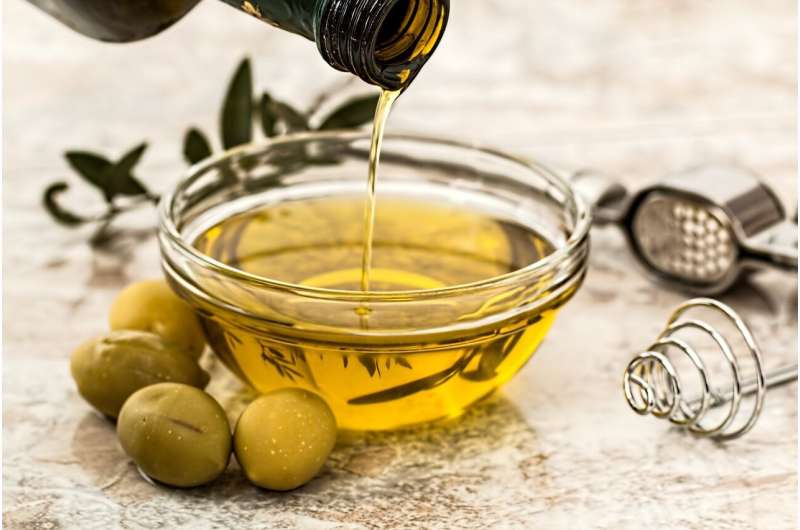This article has been reviewed according to Science X's editorial process and policies. Editors have highlighted the following attributes while ensuring the content's credibility:
fact-checked
trusted source
written by researcher(s)
proofread
Some say a shot of olive oil can prevent a hangover—here's what the science says

The search for alcohol hangover cures is as old as alcohol itself. Many cures and remedies are sold, but scientific evidence for their effectiveness is lacking.
Recently, the notion that taking a shot of olive oil before consuming alcohol can prevent hangovers has garnered attention. This idea, popularized by figures like music producer Benny Blanco who discussed it on The Tonight Show Starring Jimmy Fallon, suggests that olive oil can coat the stomach and slow the absorption of alcohol, thereby reducing hangover symptoms.
Despite its allure, this claim lacks any scientific backing and should be approached with lots of skepticism. The theory behind the olive oil trick is that its high-fat content forms a coating on the stomach lining, slowing down the rate at which alcohol is absorbed into the bloodstream. This slower absorption is supposed to lessen the intensity of hangovers.
While it is true that fatty foods can delay alcohol absorption to some extent, the effectiveness of this tactic is dubious. Alcohol absorption primarily occurs in the small intestine, with only about 20% being absorbed in the stomach. This means that even if olive oil slows down the initial absorption in the stomach, most alcohol will still be absorbed later in the digestive process.
Also, the body's metabolism or natural breakdown of alcohol, which involves the liver chemically changing it using its own protein machinery, is the primary cause of hangover symptoms such as dehydration, headaches and nausea. Olive oil does not interfere with this metabolic process in a way that would change hangover outcomes.
A comprehensive approach to preventing hangovers involves several factors, such as hydration, nutrition and alcohol moderation. While olive oil may contribute to slowing alcohol absorption slightly, it is far from a comprehensive solution.
There are better ways
Rather than relying on olive oil, there are several well-established methods to prevent or mitigate hangovers:
-
Hydration: Dehydration is a major contributor to hangover symptoms. Drinking water before, during and after alcohol consumption can help maintain hydration levels and reduce the severity of hangovers.
-
Nutrition: Consuming a nutritious meal before drinking can slow down alcohol absorption more effectively than a shot of olive oil. Foods rich in protein, fats and complex carbohydrates can provide a more balanced approach to mitigating alcohol's effects.
-
Moderation: The most effective way to prevent a hangover is to drink in moderation. Setting limits and pacing alcohol intake can significantly reduce the risk of hangovers.
-
Replenishing nutrients: After drinking, consuming foods and drinks that replenish lost electrolytes and provide essential nutrients can help the body recover. This includes options like sports drinks, fruit and vegetables.
It is worth noting that some will claim that the olive oil method works for them. However, these anecdotal accounts can often be influenced by the placebo effect. Believing in the effectiveness of a remedy can sometimes lead to perceived improvements, even if the remedy itself is not scientifically proven to be effective.
So, while the idea of taking a shot of olive oil before drinking alcohol to prevent hangovers is a temptingly simple solution, it lacks robust scientific support.
This article is republished from The Conversation under a Creative Commons license. Read the original article.![]()




















